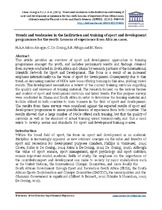Trends and tendencies in the facilitation and training of sport and development programmes for the youth: Lessons of experience from African cases.
Date
2016Author
Adom-Aboagye, N.A.A.
De Coning, C.
Bitugu, B.B.
Keim, M.
Metadata
Show full item recordAbstract
This article provides an overview of sport and development approaches to training programmes amongst the youth, and includes preliminary results and findings obtained from surveys conducted in South Africa and Ghana by research partners of the International Scientific Network for Sport and Development. This focus is a result of an increased emphasis internationally on the value of sport for development. Consequently due to this trend, an increasing number of NGOs have been offering training in this area, yielding mixed results. This development necessitates a review of the current training curricula regarding the quality and relevance of training material. The research focused on the various themes and content of sport and development curricula and latest trends. For this purpose surveys were conducted in Ghana and South Africa in order to determine the training material and toolkits utilised in both countries to train trainers in the field of sport and development. The results from these surveys were considered against the expected results of sport and development programmes to assess possible lessons of experience from both countries. The results showed that a large number of NGOs offered such training, but that the quality of curricula as well as the standard of actual training varied tremendously, and that a need exists to develop norms and standards for sport and development training courses.

